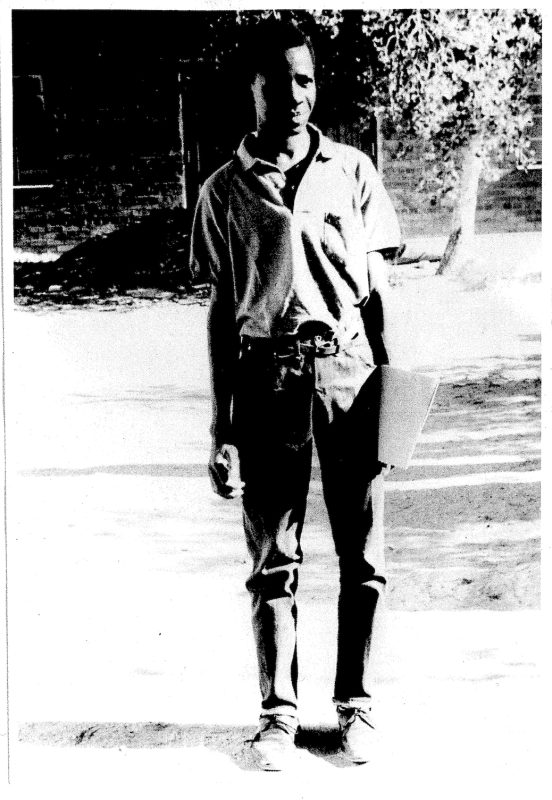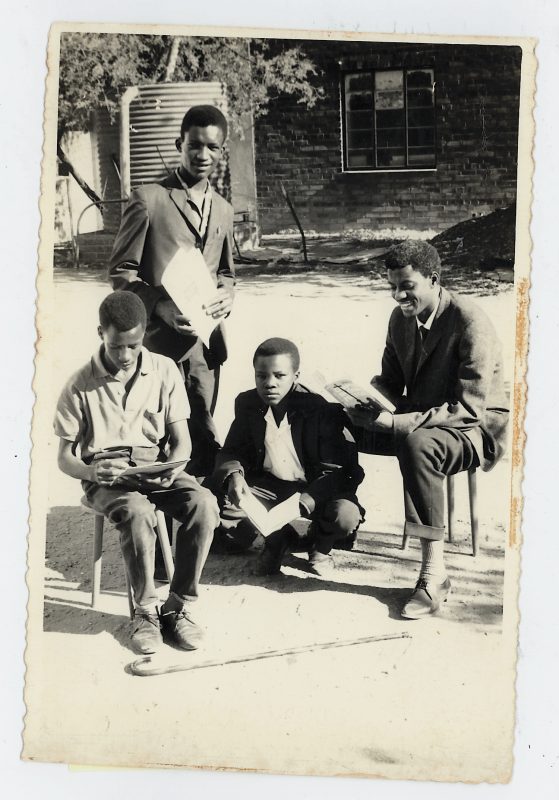When do we listen as we hear?
Can we glimpse history while listening?
In Acoustic Pasts, Echoed Futures, a loose series curating recordings from the Basler Afrika Bibliographien Archives, the reader is invited to listen to historical recordings—speech, song, music, natural sound, or noise—in order to tease the ear, move the soul or body, and bear witness to the futures of past worlds. The echoes of ‘pastness’ are convergences of the oral, the sense of hearing, and technology. Past aural worlds—compressed and mediated on wax cylinders, magnetic and other tapes or records in mp3 or WAV formats—provide sonic tracks, cracks and soundscapes, voiced anger, scintillating laughter, and raptured dancing.
***
Composition by Perivi Katjavivi. Based on the 1965 tape recording “Interview Johannes re police questioning”, BAB Archives TPA 145 2.
***
I am working with a taped recording from the 1960s—an exchange between Reverend Ronald Gestwicki, an Anglican missionary in Namibia’s Gobabis region, and Uapingena “Uapi” Ngava, a Namibian student. Uapi relates to the missionary how he had been interrogated by the colonial police, this at a time when South Africa’s state control tightened and Namibian liberation politics started to flourish.
This piece is personal for me. Uapi was someone whose presence filled the church at St. George’s Anglican Cathedral in Windhoek where I now serve as a lay minister. His absence is felt still—a testament to his steady role, remembered by those of us who saw him walk up for communion each Sunday.
I came late to religion. God was the liberation struggle, God was a DJ, God was something mystical and mysterious. But more recently it’s been something classically Anglican—(re)discovered for me while learning about the Herero God of Ndjambi-Karunga and all the atrocities attributed to Namibians by German colonial forces during the 1904-8 Herero and Nama Genocide. I am shaped not only by the faith I found confronting the Herero’s histories of genocide and spiritual traditions, but also by my earliest memories of community. I was baptised as an Anglican in Oxford, alongside Namibians like Jackson Kaujeua, while my godfather, Daniel Tjongarero, then national chairman of Swapo, stood present. I remember that Oxford house, maybe on Percy Lane in Cowley—a sanctuary for Namibians in exile, a place where the church and resistance to apartheid became inseparable. That’s the kind of church I’m trying to serve.
With this soundscape, I aim to honour voices like Uapi’s, whose clarity was often distorted by the weight of apartheid’s realities, and further alter the audio to underscore the strain of speaking up in those years.
In layering my composition over Uapi’s old voice, I hope to preserve not just his words but also the echo of resistance, reminding us that those voices remain crucial, shaping us as we carry forward that same resilience.
***

Uapingena Ngava, 1965. BAB Archives PA.145.

First students of the Anglican St. Augustine Pre-Theological School in Gobabis in 1965.
Sitting to the left: Uapingena Ngava. Standing: Asser Kamburona, with Alex Muhere and John Vikuria. BAB Archives PA.145.
Perivi Katjavivi is a Namibian filmmaker, researcher, and sound artist. His work has been screened on Netflix and at festivals in Berlinale and Rotterdam. His recent feature film, Under the Hanging Tree, was selected as Namibia’s first ever submission to the Academy Awards in the Best International Feature Film category. He holds an MA in African Cinema from the University of Cape Town and is a PhD candidate in History at the University of the Western Cape. His research focuses on how colonial sites of memory related to the Ovaherero Genocide influence everyday life in Namibia and how film can be used as a therapeutic tool in unravelling the entanglement with these sites of trauma and contemporary modern life.
The Basler Afrika Bibliographien (BAB)—Namibia Resource Centre & Southern Africa Library in Switzerland is the largest Namibia documentation centre outside Namibia. Its vast library and archive holdings are mainly used by scholars working on Namibian historical topics, with its website providing information ranging from catalogues, books, comics, posters, manuscripts, photographs, and audio-visual recordings. The series Acoustic Pasts, Echoed Futures is curated by BAB’s Dag Henrichsen and Doek!.